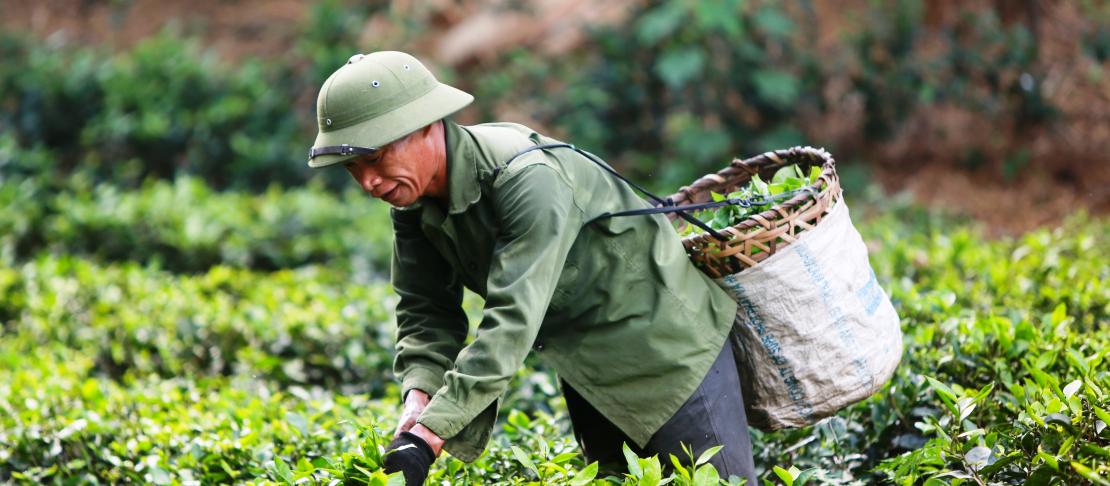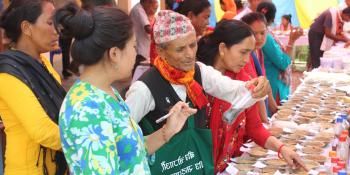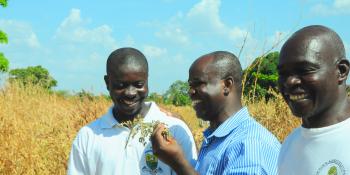Global climate program drills down on climate-smartness in Southeast Asian agriculture

Researchers and partners of CCAFS Southeast Asia revisited the basics of climate-smart agriculture during the annual progress reporting and coordination meeting.
Climate change is most talked about in Southeast Asia as its impacts have been crippling economies and livelihoods of people, especially in rural areas where they depend heavily on agriculture.
The following questions thus need to be answered: How can farmers better cope with climate change impacts through climate-smart agriculture (CSA)? What are the available climate-smart practices and technologies that work on the ground? How can best-fit CSA technologies and practices be widely adopted by farmers and provided with policy and technical support?
The CGIAR Research Program on Climate Change, Agriculture and Food Security in Southeast Asia (CCAFS SEA) sought to address these questions in more concrete terms during its 2nd Annual Progress Reporting and Coordination Meeting held between 30 November and 2 December 2016 in Hanoi, Vietnam.
“As in Phase 1, CSA is the centerpiece of CCAFS in tackling climate change in agriculture,” said Leocadio Sebastian, Regional Program Leader for CCAFS SEA, during the opening session. He furthers that the program aims for farmers and communities to practice climate-smart technologies with improved resilience to climate risks while producing food sustainably in ways that reduce carbon footprint.
In 2015, CCAFS SEA brought together its research partners to improve coordination and increase synergies among the projects and CSVs during the first coordination meeting. This year, researchers focused on sharing their theoretical and/or applied research results — successful or otherwise.
Hans Bissdorf of LuxDev and consultant to the International Fund for Agricultural Development (IFAD) commented, “It doesn’t matter whether the contribution of science is big or not. But science is important and it should contribute towards an end.”
Updates on cross-cutting themes, such as monitoring and evaluation, gender and social inclusion, and communication, were also shared. This brought the participants to reflect on other possible ways to better contribute to CCAFS SEA’s outcome targets.
Ronnie Vernooy from Bioversity International emphasized that the regional projects have a good balance between producing outputs and ensuring their usefulness to the people and communities with whom the researchers are working with.
CCAFS SEA has been supporting climate change projects across the region and in three focus countries namely, Vietnam, Laos, and Cambodia—considered climate hotspots—in partnership with CGIAR Centers, country governments, research and academic institutions, non-government organizations, and other local partners.
Since 2014, CCAFS SEA has been overseeing six Climate-Smart Villages (CSVs), which are testbeds of climate-smart agriculture practices and technologies. Tested and validated practices and technologies in these CSVs are to be outscaled (i.e. wider dissemination among farmers and across landscapes) and upscaled (i.e. policy uptake).
Central in the meeting were the work plans for 2017 and the development of a clear framework for collaboration. These discussions are necessary as the CCAFS program transitions to Phase 2.
Dr. Sebastian also stressed that as the CCAFS program transition to Phase 2 from 2017 to 2022, the research program will be more integrating across other research programs, building on the lessons and experiences of Phase 1, with the end view of catalyzing positive changes towards CSA, food systems and landscapes.
Lini Wollenberg, lead of CCAFS Flagship on Low Emissions Agriculture, stated, “The level of activity and extent of gain in knowledge among the projects being implemented in the region is remarkable. All these demonstrate a running start for Phase 2 of the capacity of the regional program to produce better outcomes.”
As the planning meeting was brought to a close, Nguyen Hong Son, Director General of the Crop Production Department of Vietnam’s Ministry of Agriculture and Rural Development, conveyed his appreciation of CCAFS’ critical role in the development of agriculture and rural areas in the country amidst climate change. He ended by restating his continuing commitment to CCAFS SEA and CGIAR Centers in implementing collaborative projects in Vietnam.
Read more:
- Creating synergies with umbrella program on climate change in SEA
- Coordinating climate-smart agriculture across Southeast Asia
- ‘Strong and unified’ agriculture with the ASEAN Climate Resilience Network
- Collaboration with climate network synergizes climate-smart agriculture efforts in Southeast Asia
Bernadette Joven is a senior communication specialist for CCAFS SEA and the International Rice Research Institute. Amy Cruz is a junior communications specialist for the World Agroforestry Centre Philippines and communication consultant with the CCAFS SEA program.



